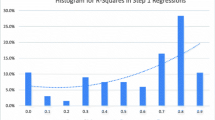Abstract
Milton Friedman has suggested that the political power of the AmericanFederation of Teachers and the National Education Association (the twomajor teachers unions) has been instrumental in defeating the adoption ofeducational vouchers. We test this hypothesis.We find that a campaign contribution to a memberof the U.S. House of Representatives by either unionreduces the probability that also a Representative will vote for apro school choice amendment to the ``No Child Left Behind Act of2001.'' Also a Representative whose districthas a large African American population or who is Republicanis more likely to vote for vouchers.
Similar content being viewed by others
References
Armey, D. (2001). From debate on H.R.1, H.AMDT.57 on the floor of the House. 104th Congress, 1st Session, 147 Cong Rec H 2590. 23 May.
Bositis, D.A. (2000). National opinion poll 1999: Education. Joint Center for Political and Economic Studies. www.jointcenter.org/selpaper/pdfiles/edu99/analysis.pdf.
Coleman, J.S., Hoffer, T. and Gilgore, T. (1982). High school achievement: Public, Catholic, and private schools compared. New York: Basic Books.
Dawson, T. (2001). Competition leaves no child behind. The Heritage Foundation. www.heritage.org/staff/dawson.html.
Evans, W. and Schwab, R. (1995). Finishing high school and starting college: Do Catholic schools make a difference? Quarterly Journal of Economics 110: 941–974.
Friedman, M. (1962). Capitalism and freedom: A leading economist's view of the proper role of competitive capitalism. Chicago: Chicago University Press.
Friedman, M. (1995). Public schools: Make them private. Cato Institute Briefing Papers No. 23.
Garrett, J. (2002). Another look at how members of congress exercise school choice. The Heritage Foundation Backgrounder No. 1553. www.heritage.org/library/backgrounder/bg1553.html.
Greene, W.H. (2000). Econometric analysis. Upper Saddle River, NJ: Prentice Hall.
Howell, B. and Peterson, P. (2002). The education gap. Washington DC: Brookings Press.
Hoxby, C. (1994). Do private schools provide competition for public schools? National Bureau of Economic Research Working Paper No. 4978.
Hoxby, C. (2000) Does competition among public schools benefit students and taxpayers? American Economic Review 90: 1209–1238.
Hoxby, C. (2001). The economics of school choice. Allen Starling Johnson, Jr. Distinguished Lecture hosted by the Economics Department at Duke University.
Hoxby, C. (2002). School choice and school productivity. National Bureau of Economic Research Working Paper No. 8873.
Krueger, A.N. and Zhu, P. (2002). Another look at the New York City school voucher experiment. Prepared for the “conference on randomized experimentation in the social sciences,” Yale University, August 2002.
Ladd, H.F. (2002). School vouchers: A critical view. Journal of Economic Perspectives 16: 3–24.
Levin, H. (1992). Market approaches to education: Vouchers and school choice. Economics of Education Review 11: 279–285.
Neal, D. (1997). The effect of Catholic secondary schooling on educational achievement. Journal of Labor Economics 15: 98–123.
Neal, D. (2002). How vouchers could change the market for education. Journal of Economic Perspectives 16: 25–44.
Nechyba, T. (2000). Mobility, targeting, and private-school vouchers. American Economic Review 90: 130–146.
Moe, T. (2002). Beyond Zellman: An essay on the future of vouchers. Prepared for the conference “what next for school vouchers?” Harvard University, October 2002.
Rose, L. and Gallup, A. (2002). The 34th annual Phi Delta Kappa/Gallup poll of the public's attitudes toward the public schools.
Rouse, C. (1997). Private school vouchers and student achievement: An evaluation of the Milwaukee parental choice program. National Bureau of Economic Research Working Paper No. 5964.
Smith, A. (1789/1976). An inquiry into the nature and causes of the wealth of nations. Chicago: University of Chicago Press. A reprint of the fifth edition, initially published in 1789.
U.S. Census Bureau. United States census 2000. www.census.gov/main/www/cen2000.
Author information
Authors and Affiliations
Rights and permissions
About this article
Cite this article
Gokcekus, O., Phillips, J.J. & Tower, E. School Choice: Money, Race, and Congressional Voting on Vouchers. Public Choice 119, 241–254 (2004). https://doi.org/10.1023/B:PUCH.0000024170.63342.3b
Issue Date:
DOI: https://doi.org/10.1023/B:PUCH.0000024170.63342.3b




